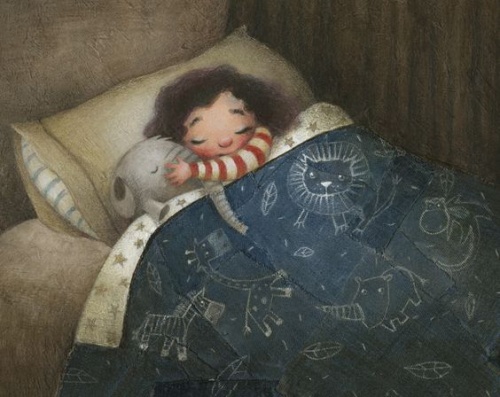There's a Name for Babies Who Wake Up at Night: Normal


Written and verified by the psychologist Valeria Sabater
Babies who wake up at night several times are usually given a very specific name in the field of medicine: a normal child. The sleep cycle in little ones is sometimes a source of stress, a process that really only needs two magical ingredients: time and patience. Children’s brain matures little by little.
Many moms and dads often believe that babies “must be taught to sleep.” We all know that our children need habits and routines in order to feel safe, where they can predict what is going to happen in each moment and build associations that help them understand the world around them.
Now, in referring to sleep, we are speaking about a biological instinct that is still immature in babies and young children. Over time, babies develop enough so that little by little, you’ll both eventually get an uninterrupted rest for about 7 to 9 hours in a row.
When your child does not sleep at night
If there is anything that still remains a mystery to this day, it’s dreams. There are studies that reveal a 32-week-old fetus could “dream” while sleeping in its mother’s womb. But science cannot yet explain why there are children who sleep all night long and others who are unable to sleep for a three-hour period.

We have to take into account one detail: it doesn’t matter that the baby is only a few weeks old and that his experience with the world around him is still negligible. The basis of personality is established in the brain of each child, defining unique individual needs that will differentiate it from any other. Therefore, we need to be intuitive and sensitive to those needs.
Anxiety and fear
When you have a baby who wakes up at night often, little by little an atmosphere of anxiety and worry is created. You wonder if something is wrong with him, if he is sick or if there’s something you’re doing wrong.
- Don’t ever think that you’re doing something wrong just because your baby wakes up at night. It is a completely normal process.
- We have to realize that life does not always coincide with what is written down in books. Not all formulas work, nor are all children the same.
- It is necessary to understand that a baby comes into the world being completely dependent on us. Nighttime, in which the light is turned off and they are left alone, is often a terrible source of anxiety and fear for children. They fear for their survival. They don’t know if you’ll return, if they have been left alone forever or if the darkness will be eternal.
Almost all of the baby’s behavior is instinctive. We cannot convince him that “nothing will happen” to him when we leave him in the crib. The only thing that a child understands is the security of physical contact, of the protection of the mother’s voice speaking to him with affection, and of those arms that provide such security.
Over time, this fear, like many others with purely instinctive roots, will fade away little by little. Meanwhile, we only need high doses of patience and a great deal of understanding.

How to handle babies who wake up at night
According to neurologists, a child’s brain is fully mature around 7 years old. All neural networks are surrounded by myelin, and their electrical pattern changes to the point that their dream cycles will be more regular and night terrors will reduce.
We also know that learning it will be 7 years before their child will rest regularly can be a somewhat traumatic fact for parents. However, some children can do so by three years old, and in general there are many differences from child to child.
What is the best technique to get a child to sleep at night?
Until not long ago, the classic “Estivill method” was very fashionable, which, until recently, argued that it was advisable to let the child cry in solitude at night in the crib until it calmed down. Now the author himself emphasizes the opposite.
- It is not advisable to neglect a crying child, as this causes unnecessary stress in the baby’s brain, which can be alleviated with a simple caress, a word, or a hug to show the child that everything is fine.
- We must also understand that there is no “magic formula” for all children. Each mother must discover the most effective method for her child, something that time, chance or simple routines will uncover little by little.
- However, it never hurts to remember that children should not be brought to their cribs too tired, that naps during the day tend to impede a deep sleep, and that toys or luminous pendants placed on cribs are stimuli that activate a child’s attention. At night, they are not recommended.

Be patient, respect your child’s own pace, and understand that it is not always easy to adapt to that world where suddenly the light goes out and the baby is unable to understand what has happened to you and whether you will return to be with him. Months, years, and love will give him all the answers to these insecurities.
All cited sources were thoroughly reviewed by our team to ensure their quality, reliability, currency, and validity. The bibliography of this article was considered reliable and of academic or scientific accuracy.
- RODRÍGUEZ, A. S., & GARCÍA, B. R. (2005). Hábitos de sueño en la revisión del niño sano. Bol pediatr, 45, 17-22. http://www.sccalp.org/boletin/191/BolPediatr2005_45_017-022.pdf
- Pin Arboledas, G., & Lluch Rosello, A. (2011). El sueño en el primer año de vida:¿ cómo lo enfocamos?. Pediatría Atención Primaria, 13, 101-111. http://scielo.isciii.es/scielo.php?pid=S1139-76322011000400011&script=sci_arttext&tlng=en
- Jové, R. (2006). Dormir sin lágrimas: dejarle llorar no es la solución. La esfera de los libros. https://books.google.es/books?hl=es&lr=&id=GqjHAgAAQBAJ&oi=fnd&pg=PA163&dq=dormir+sin+lágrimas&ots=U322CjAGmV&sig=VlHXLTlw3hvJOPDB__rOHXfZwMU
- González, C. (2012). Bésame mucho: cómo criar a tus hijos con amor. Temas de hoy.
This text is provided for informational purposes only and does not replace consultation with a professional. If in doubt, consult your specialist.
